QuestionMY <a href="http://websearch01.mcclient.com/search.php?s=german+sheperds+&rnd=qagbgq" onmouseover="window.status='http://allexperts.com/info.php?german'; return true;" onMouseOut="window.status='Done'; return true;">German</a> IS 1 1/2 MONTH OLD AND I WOULD LOVE TO KNOW HOW TO GET HER TO LET ME KNOW WHEN SHE NEED TO GO. ALSO WOULD LOVE TO KNOW WHAT FOODS IS BEST FOR GERMANS AND HOW TO FEED?
AnswerI am going to paste in some general material covering what I think you need. 1 1/2 months is the minimum age to bring home a puppy. In order for her to fit in with other dogs when older, be sure and let her play with other young dogs some. These must be carefully selected, known to be healthy and up to date on shots dogs. Find out what the breeder is feeding. If it is dry chow you can buy readily, I would stick with it until the dog is 4 months old, at that time switching to a dry adult chow. If not, try to have the breeder give you a few days supply to use making a gradual change to a dry puppy chow. Sudden changes in diet are never good, perhaps creating digestive upsets. Unlike the greedy Labs I have more experience with, many Shepherds are not big eaters. The concentrated chows make more sense for them. My daughter is picking up a 7 week old German Shepherd next Saturday. They will be given a small bag of Pro Plan chicken and rice puppy chow with it. My 4 month old Lab/Golden cross finished of the last of her puppy chow today, and is eating Pro Plan adult chicken and rice now. Both puppies are part of a dog guide program. Nobody knows more about caring for large breed puppies.
Three times a day, put down a half cup of food. Take up any not eaten in 15 minutes and do not give her any more until the next scheduled meal. Cut back to 2 meals a day at 4 months, and you may cut back to 1 at 6 months if you want to. Gradually increase what you are giving her as long as she eats it all, and maintains a good lean body like the link below shows. When she is a little order, if she refuses to eat enough to keep her ribs completely hidden, grit your teeth and endure it. Many young Shepherds are that way. Did you ever see a fat wolf?
If I have left questions unanswered, post back.
Much of housebreaking is not training the puppy, but making it easier for your
puppy, you, and your carpet while its body to catches up to its instincts. At
around 8 weeks when the puppy goes to its new home, the time from when it
realizes it has to go, and when it can't wait any longer is a matter of
seconds. Only time will fix that. You can hardly be expected to be attentive
enough to avoid all accidents There is no sense punishing the puppy for your
inattention. It is not fair to punish you either, but you still have to clean
it up if you didn't have the puppy outside in time.
Housebreaking starts before you get home with the new puppy. If you don't have
a crate, buy one. I prefer the more enclosed, den like plastic ones. Skip the
bedding. At first it gets wet, and later it can be chewed into choking
hazards. A wire rack in the bottom will help keep the puppy up out of
accidents at first. They are available with the crates, but a piece of closely
spaced wire closet shelving from a home supply place is cheaper. If you
already have a metal crate, covering it may help. Just make sure you use
something the puppy can't pull in and chew. Dogs that start out in crates as
little puppies, accept them very well. Never leave an unattended puppy loose
in the house. If nobody can watch it, put it in the crate. I suggest letting
the dog have its crate all its life.
Choose a command and spot you want it to use. The less accessible to strays,
the less chance of serious disease. If it is a female, choosing a
non grassy spot will avoid brown spots later. When you bring it home, take it
to the spot and give it the command in a firm, but friendly voice. Keep
repeating the command and let the puppy sniff around. If it does anything,
praise it. Really let it know what a good dog it is and how much you love it,
and maybe a treat. Note, being out there not only means you can praise it,
but it also keeps it from being snatched by a hawk. If it doesn't go, take it
inside and give it a drink and any meals scheduled. A young puppy will need to
go out immediately afterward. Go to the spot and follow the above routine.
Praising it if it goes is extremely important. If it doesn't go, take it back
inside and put it in its crate and try again soon. Do not let it loose in the
house until it does go.
At first it is your responsibility to know and take the puppy out when it
needs to go. It needs to go out the first thing in the morning, after eating,
drinking, and sleeping. If it quits playing, and starts running around
sniffing, it is looking for a place to go. Take it out quickly. You will just
have to be what I call puppy broke until it is a little older.
By the time most dogs are about 3 months old, they have figured out that if
they go to the door and stand, you will let them out. The praise slowly shifts
to going to the door. Some people hang a bell there for the dog to paw. If
your dog doesn't figure this out, try praising it and putting it out if it
even gets near the door. A stern "Bad dog!" is all the punishment that is
effective, and only when you catch it in the act and are sure you didn't miss
it going to the door. Clean up accidents promptly. I mostly keep the little
puppies out of the carpeted rooms. Still I need the can of carpet foam
sometimes. First blot up all the urine you can with a dry towel. Keep moving
it and stepping on it until a fresh area stays dry. A couple big putty knives
work well on bowel movements. Just slide one under it while holding it with
the other. This gets it up with a minimum of pushing it down into the carpet.
This works with even relatively soft ones, vomit, dirt from over turned house
plants, or anything else from solids to thick liquids. Finish up with a good
shot of carpet foam. Note, do not let the puppy lick up the carpet foam.
Once the dog is reliably housebroken, your carpet may need a good steam cleaning.
Many people strongly strongly push cleaning up all evidence of past accidents. I am slower to suggest that. Dogs will return top the same spot if they can find it. When you see one sniffing the spot, that is your clue to run it out.
You should be feeding a puppy chow now. Switching to an adult chow for the
larger breeds at 4- 6 months, slows growth and helps develop sturdier
joints.
Your dog definitely should be narrower at the waist than the hips and chest.
You should be able to easily feel the ribs, but not see them. Each dog is
different. Standard recommendations are a good place to start, but each dog
must have its food adjusted to its individual needs. See
http://www.purina.com/dogs/nutrition.asp?article=292
The dry dog foods are actually better for the dogs. It helps keep the teeth
clean, and exercises the jaws and teeth. If you feed a complete dog chow, you
shouldn't need to give the dog anything else. Various people foods may only
add more calories without providing proper nourishment. Look at how many of
us are too fat too. If you don't want to pay name brand prices look for
certification of passing the AAFCO tests. Make any changes in diet slowly
over about a week.
The premium, concentrated foods give you the assurance of a brand name. They
produce a smaller, firmer stool that is easier to clean up. It is easier to
maintain weight on a finicky eater. The lower cost foods may actually have
lower fat and be better for your dog. Many dogs would enjoy eating the larger
portions you have to feed .

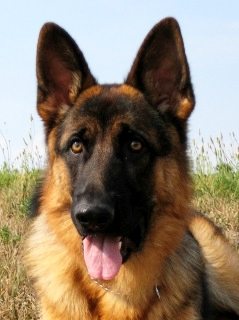 2yo German Shepherd Male
Question
My Boy...
Hi there....I have a 2 year old, pur
2yo German Shepherd Male
Question
My Boy...
Hi there....I have a 2 year old, pur
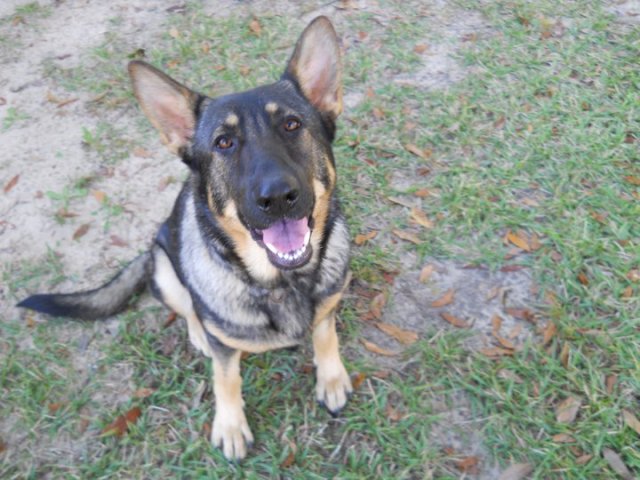 Training rescued German Shepherd
Question
Libby
My boyfriend and I have recently took in
Training rescued German Shepherd
Question
Libby
My boyfriend and I have recently took in
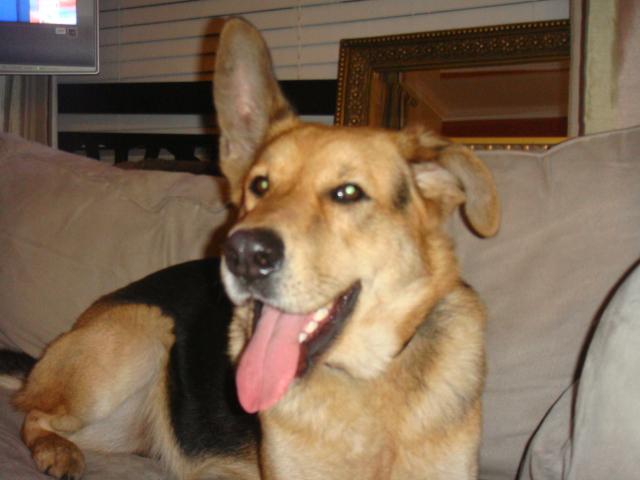 Shepherd ears/teeth
Question
Rosco
We have just taken in a shepherd that we
Shepherd ears/teeth
Question
Rosco
We have just taken in a shepherd that we
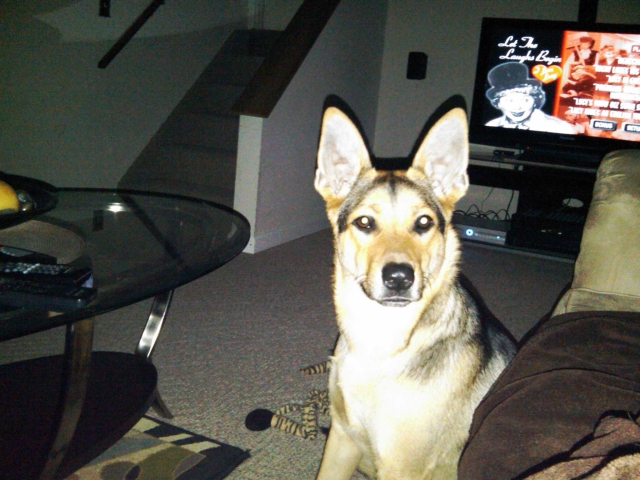 My German Shepherd Acts Scared
Question
Mannie
I have a male 1/2 German Shepherd 1/2 H
My German Shepherd Acts Scared
Question
Mannie
I have a male 1/2 German Shepherd 1/2 H
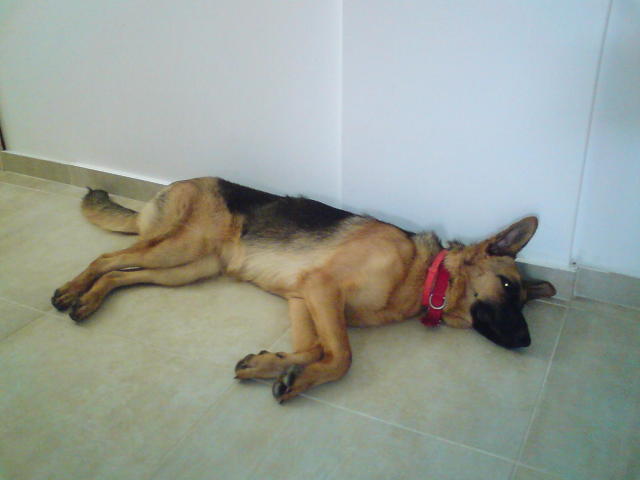 puppy growing thin and tall
Question
Lying down
Hi, I have a 9 month old German She
puppy growing thin and tall
Question
Lying down
Hi, I have a 9 month old German She